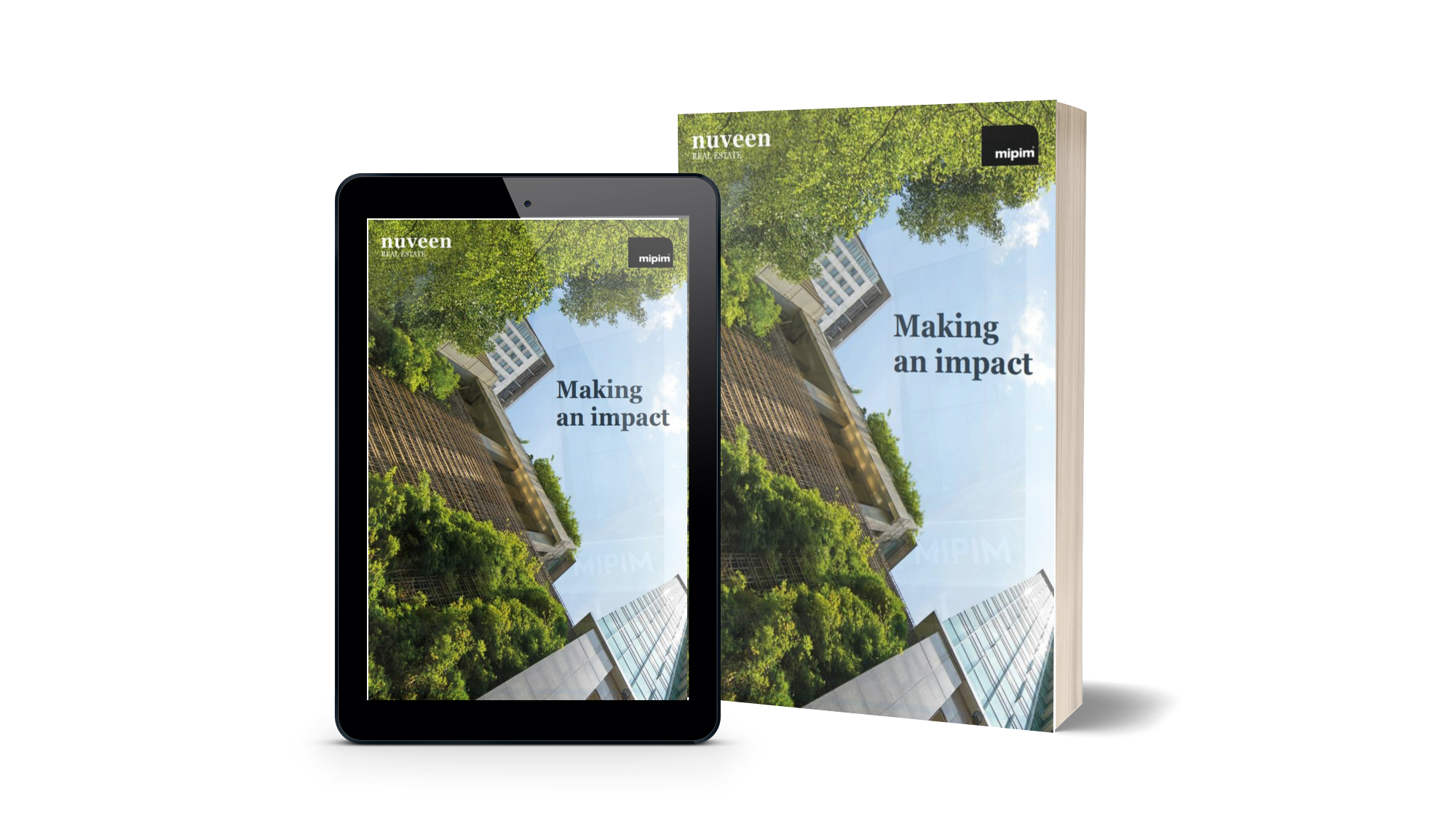The 2010’s saw the sector gain serious momentum, growing from a tiny, largely ignored niche, to a circa $10-15 billion a year distinct investment class. At this scale, there should be no loss of entrepreneurial enthusiasm, but there has to be a shedding of a rather too prevalent ‘amateur hour’ approach. This decade is going to be transformational for real estate, globally, and the PropTech community must rise to the occasion. Technically, culturally, organisationally and financially we are going to see a huge change, and the PropTech community has to not only be part of that change but to frame and define it.

"Making an impact"- White paper
Successful impact investing in real estate
To ‘invent the future’ we need to think hard across five dimensions in real estate: Data, User Experience, Talent, Investments, and Sustainability. These are going to be the focus of an ongoing series of essays that Propel by MIPIM will be curated throughout the year. Our aim is to help you learn what matters because what matters, matters a lot.
This is why:
-
Data
The mid 20th-century statistician and management consultant W Edwards Deming wrote, ‘In God we trust, all others bring data’, and that is a good starting point for any business today. Without access to reliable, unbiased, discrete and time-series data it is not possible to actively participate in the modern world.
That statement alone gives us a sense of the challenge ahead; just how many corporate entities in real estate do have access to reliable, unbiased, discrete and time-series data today? Or ask yourself how many real estate workflows take place at a very high level of efficiency and effectiveness? The answers, of course, are related. Real estate is an industry that runs sub-optimally, to put it mildly. We all know this, but historically it has frankly not mattered all that much. Increasingly it will matter more and more, so this is the foundational issue that we need to work on and solve.
Data alone is not enough to power a modern business, but without it, you’ll have no business.
What data matters, what to collect, how to store, process and analyse it, and how to think about data in terms of Privacy, ethics and best practice is something we will explore at length.
-
User Experience
The biggest issue facing the real estate industry is that the nature of demand is changing. Driven by many factors, but primarily by the capabilities of modern technology, how we use real estate is very different today to 10 or 20 years ago. Most pertinently, we no longer need physical retail stores to do our shopping or indeed offices to do our work. The store used to be the main distribution channel for goods, and offices used to be where your computer, your files and your colleagues were. Today, Mr Bezos will deliver to me, in under a day, just about anything I want, and my computer, files and access to my colleagues reside in the $30 million dollars 1980’s supercomputer in my pocket. This entirely changes the dynamics of real estate; our customers no longer need our product. It is a very different world where you have to make your customers want your product, as opposed to them needing it. Essentially the power balance is upended.
Welcome to ‘User Experience’, perhaps the most critical new skill that the real estate industry needs to thrive in the 2020s. Unless we are able to create user experiences for our customers that are superior to them using the technological tools at their disposal (4 billion people have smartphones in the world, 1.5 billion of which are iPhones) we will be the owners of wilting assets. Not necessarily becoming entirely redundant but certainly subject to endless pricing pressure and static or diminishing value.
The known unknown today is what is meant by a great user experience, how to create and curate it, and who is best placed to do so? Sure, we know a lot more about UX than we did 5-10 years ago but truly we are in the foothills of discovery here.
The advantage that we do have though is that it is transpiring that as we humans need human connectivity a lot less than we used to, we are wanting it more and more. We are a social species. The difference going forward is that what we want in terms of human connectivity is not what we used to have. Again, everything changes when you do not need something; what you really want can be a moveable feast.

"Making an impact"- White paper
Successful impact investing in real estate
-
Talent
The need for user experience skills segues neatly into our third key dimension; talent.
Real estate has never been a very diverse industry, but it is going to need to become one.
As business becomes more and more automated (various studies have estimated that roughly half of the tasks people are paid to do around the world could be automated) we are going to see a paradox develop. The most technologically advanced businesses are going to be requiring the most highly developed human skills. The requirement for advanced technologists is actually quite limited (even GAFA – Google, Amazon, Facebook, Apple – have 10’s of thousands, rather than hundreds or millions, of truly tech employees) but the requirement for people who understand enough about technology to know how it can be leveraged to augment human skills is huge. Increasingly we are going to see multi-functional teams becoming the norm, where the three principal types (thinkers, feelers, doers) work together to solve problems, imagine, empathise, design, create and all the other deeply human things we humans are capable of.
Within PropTech, the biggest challenge around skills is going to be around building teams that have very strong technical skills but also deep real estate domain knowledge (as of today most PropTechs are strong in only one or the other) and then on top of that all the other skills that are required to develop products and services that not only solve customers problems but deeply engage with them. Technology is no longer a standalone subject but an embedded capability at the heart of any companies business model.
Real estate needs many new skills and needs to upgrade those it does have. This is unlikely to happen uniformly across the industry; early adopters of this new way of thinking stand to gain a significant advantage.
-
Sustainability
Perhaps THE most important dimension across real estate for 2020 and throughout the next decade. Why? Look no further than five words from Larry Fink in his 2020 letter to shareholders:
‘Climate Risk is Investment Risk’
As soon as climate risk becomes thought of as investment risk by companies like Blackrock (with $6 trillion AUM) then our world changes. Regardless of whether you are a true Thunbergian believer or a Trumpian, is irrelevant. It no longer matters. Real estate exists at the whim of ‘the money’ – when ‘the money’ says climate risk matters, it matters. The direction of travel has shifted. Taking this seriously has to now be the default setting.
And what an opportunity that is, because the industry is hopelessly behind the curve. We do not have the knowledge, the understanding, the skills, the capabilities or the people to do what is needed. The UK has ‘pledged’ to be Net Carbon Zero by 2050. As have other countries, signatories to the Paris Climate Agreement. With the tools at our disposal today this will be impossible. But it is far from inherently impossible; given the right mindset, attitude, regulatory carrot and stick, R&D and commitment of capital this is absolutely achievable.
Great Brands and Businesses are going to be built on top of ‘Climate Risk is Investment Risk’. There are myriad problems to be solved, and whoever solves almost any of them is going to find a vast, global market to sell into.
Within real estate, we know that, as the industry responsible for 40% of annual global carbon emissions, we are not going to get a free pass from the rest of society. We have to step up to the plate. Let fear and greed work their magic.
-
Investments
All the above are inputs into our fifth and final dimension; Investments. The 2020’s is going to be a great decade to make a lot of money or lose a lot of money. It is going to be a hard decade to simply preserve money. The nature of demand, across all asset types, is changing so dramatically that the supply side is going to have to adapt to meet this demand. Being left holding an asset perfectly suited for a demand that has evaporated is going to be unusually easy. Without understanding how demand is changing, and why, asset owners are exposing themselves to much potential pain. The retail sector demonstrates this perfectly, as it is some 5-10 years ahead of the office market, for example. Huge value has been destroyed in retail recently, and much of this was predicted years ago. Many real estate people active in the retail sector simply refused to listen to many people, mostly from the tech industry, explaining why e-commerce was going to be a big thing. ‘No-one will buy clothes online’ was an opinion that particularly troubled me!
The drivers of value, of valuation, are changing. Across all asset classes. Indeed even the very notion of distinct asset classes is under discussion. What is an office, a store, an apartment, a hotel, a distribution centre? In many cases something very different to what they were 10 or 20 years ago. “All is flux; nothing stays still.” said the Greek philosopher Heraclitus 2,500 years ago: we’d be wise to take that to heart in real estate in 2020.
So, five dimensions of real estate to pay especial attention to this year: Data, User Experience, Talent, Sustainability and Investments. All are linked, all are equally important and all will be key inputs to creating meaningful, valuable, profitable outputs.
We will be diving deeper into each of them in turn over the coming months, and very much look forward to hopefully spurring widespread industry-wide debate.



